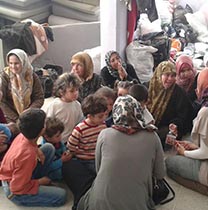Parenting challenges and needs in Syrian refugee families
Background to the research
Millions of families worldwide have been displaced from their homes due to conflict in their home countries. They face new and difficult parenting challenges. Our studies explore parenting experiences of families living as refugees having fled Syria, investigating the particular challenges they face in parenting their children, and how specific parenting skills can help.
Where was the study conducted?
Numerous sites on the Syrian-Turkish border were accessed to collect data:
- Schools in Reyhanli, Turkey
- Two refugee camps in Syria reached via the Bab al-Salameh and Bab al-Hawa border crossings
- One refugee camp in Turkey
- A building housing refugees who had just arrived in Turkey
Logistical support to cross the border and access refugee camps and schools was provided by Generation Freedom.
Assessing children’s mental health
Questionnaires were administered to parents and caregivers to assess the mental health of children in schools, refugee camps and a building housing refugees. The results revealed high levels of psychological distress in the 106 children assessed.
49% of children were experiencing clinical levels of anxiety and withdrawal.
62% were experiencing abnormally high levels of fear.
34% were experiencing clinical levels of behavioural difficulties such as acting more aggressively.
Interviews with parents living in refugee camps on the Turkey-Syria border
Interviews and focus groups were carried out with Syrian refugee families who had fled their homes due to the conflict in Syria. The research was conducted in refugee tents and schools both inside Syria and along the Turkey-Syria border.
What did parents say?
Parents reported urgently wanting help in understanding how best to parent their children. One of the most common difficulties parents highlighted was a big change in communication between themselves and their children. They reported that their children were much more frequently not doing as they were asked, thus compromising both their safety and health, while living in such challenging living conditions.
They made clear their need for help with behavioural and emotional changes in their children, and in their parenting approaches. “They are spitting and hitting and shouting and using bad words. Sometimes I can’t believe these are my children, we all say this. They are very bad now.”
Many of the descriptions of their concerns reflected their struggles to help children affected by trauma, especially how to help their children cope with fears and nightmares. “They cry at night, they scream a lot while they are sleeping. They are very angry. They have so many unanswered questions that I do not know how to answer”. Maintaining a safe environment and keeping children clean and healthy in the camp context while facilitating play was also a concern.
How are we using the information gathered in these studies?
Data from these studies has guided the development of parent training materials and programmes tailored for families living through displacement, and other challenging settings. Studies examine the efficacy and acceptability of parent skills training with families in challenging settings and refugee families. We examine the impact the information can have for parenting and child and parent mental health in these contexts.
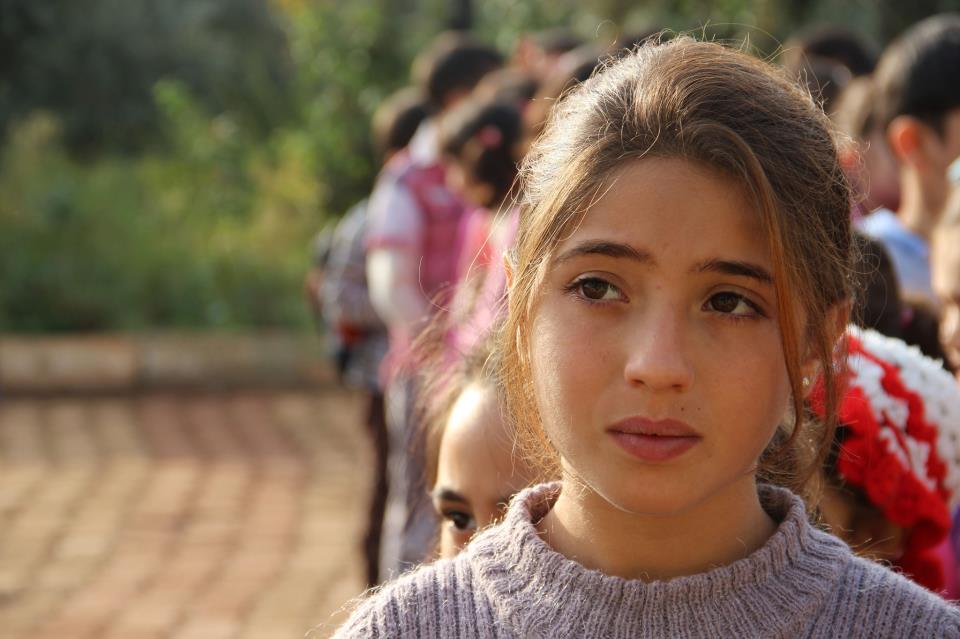
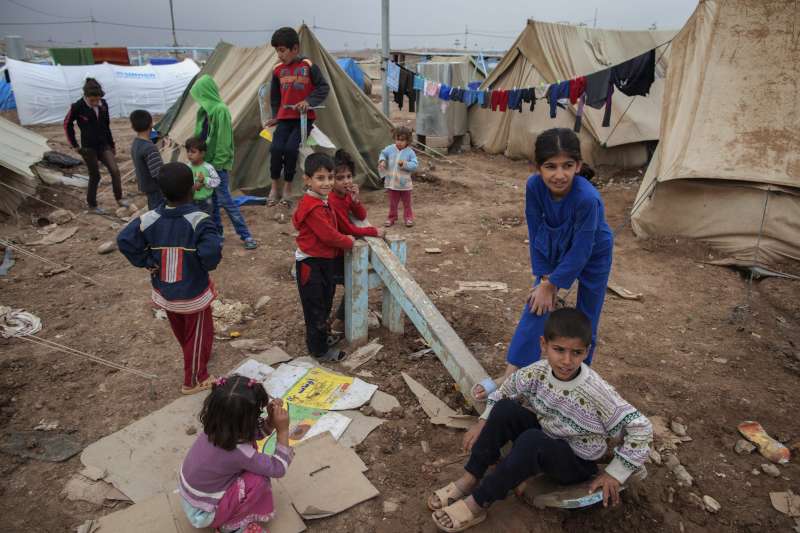
Research Outputs
El‐Khani, A., Maalouf, W., Baker, D. A., Zahra, N., Noubani, A., & Cartwright, K. (2019). Caregiving for children through conflict and displacement: a pilot study testing the feasibility of delivering and evaluating a light touch parenting intervention for caregivers in the West Bank. International Journal of Psychology.
El-Khani, A., & Calam, R. (2019). Promoting mental health for children and their caregivers affected by the Syrian conflict. In An International Perspective on Disasters and Children's Mental Health (pp. 301-322). Springer, Cham.
El-Khani, A., & Calam, R. (2018). The role of values and religious beliefs in positive parenting. The power of positive parenting: Transforming the lives of children, parents, and communities using the Triple P system. Oxford University Press (pp .344-353).
El-Khani, A., Ulph, F., & Calam, R. (2018). Syria: Refugee parents’ needs and experiences of parenting information in refugee camps. Vulnerable Children and Youth Studies 13:1, 19-29
El-Khani, A., Cartwright, K., Redmond, A. D., & Calam, R. (2017). Testing the feasibility of delivering and evaluating a child mental health recovery programme enhanced with additional parenting sessions for families displaced by the Syrian conflict: A pilot study. Peace and Conflict: Journal of Peace Psychology
Calam, R. (2017). Public health implications and risks for children and families resettled after exposure to armed conflict and displacement. Scandinavian Journal of Public Health, 45(3), 209-211.
El-Khani, A., Cartwright, K., Redmond, A. D., & Calam, R. (2016). Daily bread: a novel vehicle for dissemination and evaluation of psychological first aid for families exposed to armed conflict in Syria. Global Mental Health.
El-Khani, A., & Calam, R. (2016). Giving families a chance of peace in war. British Psychological Society, 108-113. Publication link: 85a659f9-db00-48ee-a8ea-4a4f3c0c90b2
El-Khani, A., Ulph, F., Peters, S., & Calam, R. (2016). Syria: the challenges of parenting in refugee situations of immediate displacement. Intervention,14(2), 99-113.
El-Khani, A., Ulph, F., Peters, S., & Calam, R. (2016). Syria: Coping mechanisms utilised by refugee parents caring for their children in preresettlement situation. Intervention, Nov 2016.
Cartwright, K., El-Khani, A., Subryan, A., & Calam, R. (2015). Establishing the feasibility of assessing the mental health of children displaced by the Syrian conflict. Global Mental Health, 2, e8.
El-Khani, A., Ulph, F., Redmond, A. D., & Calam, R. (2013). Ethical issues in research into conflict and displacement. The Lancet, 382(9894), 764-765.
Email Aala El-khani: Aala.El-khani@manchester.ac.uk
The University of Manchester is not responsible for the content of external internet sites.
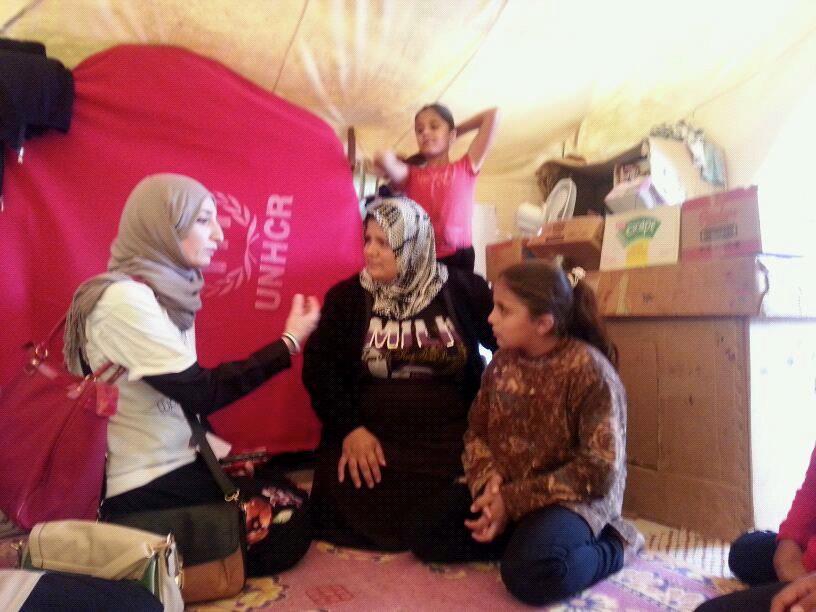
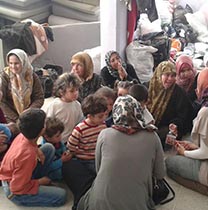
Caption: Dr. Aala El-Khani speaks with mothers about their experiences raising children in a refugee camp in Syria and Turkey as part of her PhD research


